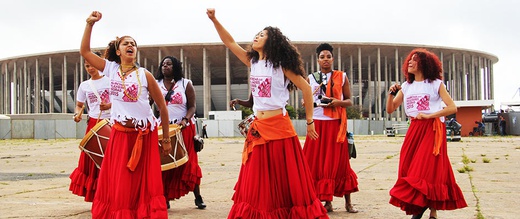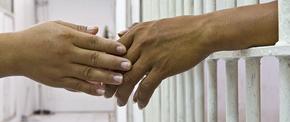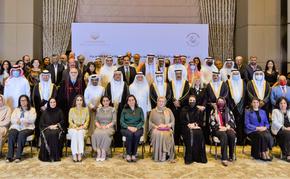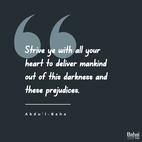The views expressed in our content reflect individual perspectives and do not represent the official views of the Baha'i Faith.
Everyone has a responsibility to prevent and end violence against women and girls, starting by challenging the culture of discrimination that allows it to continue. We must shatter negative gender stereotypes and attitudes, introduce and implement laws to prevent and end discrimination and exploitation, and stand up to abusive behavior whenever we see it. We have to condemn all acts of violence, establish equality in our work and home lives, and change the everyday experience of women and girls. – Ban Ki-Moon, Secretary-General, United Nations
 Years ago, soon after I graduated from college, a friend of mine asked me to help her with a volunteer commitment she’d made, working as a counselor in a women’s shelter. The shelter, a large house in a neighborhood in town, needed some maintenance. Because it housed battered women, those who had suffered violence and assaults from boyfriends or husbands, the shelter manager was reluctant to call just any handyman, worried that the secret location of the shelter might be compromised if the wrong male was allowed to enter the premises. My friend, who knew about the non-violent nature of my Baha’i beliefs, convinced the manager that I would keep the shelter’s secrets.
Years ago, soon after I graduated from college, a friend of mine asked me to help her with a volunteer commitment she’d made, working as a counselor in a women’s shelter. The shelter, a large house in a neighborhood in town, needed some maintenance. Because it housed battered women, those who had suffered violence and assaults from boyfriends or husbands, the shelter manager was reluctant to call just any handyman, worried that the secret location of the shelter might be compromised if the wrong male was allowed to enter the premises. My friend, who knew about the non-violent nature of my Baha’i beliefs, convinced the manager that I would keep the shelter’s secrets.
I readily agreed to help, and I showed up that afternoon with my tools, ready to go to work and fix a few things. Sworn to secrecy about the location of the shelter, I expected to just go in, do what needed to be done and leave. I had no idea how deeply that afternoon would affect me emotionally.
Growing up in a large family, I had the benefit of a chivalrous father. He could be violent, but never against women. He taught me that only cowardly men hit women. No matter how angry you get, he said, you will never, ever strike a woman.
His ideas came from the old-school traditions of weak women and strong men, of course, but they made sense to me as a boy. Although my father had no problem hitting me, he never struck my mother or my sisters, so his actions definitely matched his philosophy. I’m grateful to him for teaching me that lesson early, and I carried that mindset into the women’s shelter as I rang the doorbell.
The director of the shelter answered, and she asked me to come in. We stood in the entryway as she explained that I was the first man ever to enter the shelter, and that she had warned the women there, but I should still be prepared for whatever negative reactions the residents might have. Then she walked me through the house, showing me the few small maintenance jobs I would need to do.
As we walked I saw several women who looked like they had been beaten severely. Many had broken bones, limping with plaster casts on legs, or had slings holding their fractured arms. Most had facial injuries—split lips, black eyes, broken noses, crushed cheeks. Two rode in wheelchairs. One, who I glimpsed through an open door, lay immobilized in a hospital bed.
Seeing their injuries, however, wasn’t the worst thing I witnessed. Instead, watching the women cringe, flinch and shrink away as they saw me affected me the most. At least three of the women burst into tears when I came into view. I felt like some cruel barbarian, a brutalizer of women, part of a male species who used their size and dominance to inflict pain and terror. A few women fled as they spotted me, slamming doors behind them, obviously traumatized just by the sight of a male. I’ve never hit a woman, but on that day I felt those women’s reactions as if I had, and I felt ashamed of my entire gender. The experience stayed with me for a very long time. I can still see the injured faces of those women today.
I learned, from what I saw there, to have no tolerance for violence against women. That’s why, every year on November 25, I try to observe the U.N.’s International Day for the Elimination of Violence against Women:
Did you know that:
- 35% of women and girls globally—one-third of all females—experience some form of physical and/or sexual violence in their lifetime?
- In some countries, up to seven in ten women face physical or sexual abuse?
- An estimated 133 million girls and women have experienced some form of female genital mutilation/cutting in the 29 countries in Africa and the Middle East where the harmful practice is most common?
- Worldwide, more than 700 million women alive today were married as children, 250 million of whom were married before the age of 15?
- Girls who marry before the age of 18 are less likely to complete their education and more likely to experience domestic violence and complications in childbirth?
The Baha’i teachings firmly condemn all violence against others, and allow for no justification of such brutal behavior:
The use of force by the physically strong against the weak, as a means of imposing one’s will and fulfilling one’s desires, is a flagrant transgression of the Baha’i Teachings. There can be no justification for anyone compelling another, through the use of force or through the threat of violence, to do that to which the other person is not inclined. Abdu’l-Baha has written, “O ye lovers of God! In this, the cycle of Almighty God, violence and force, constraint and oppression, are one and all condemned.” Let those who, driven by their passions or by their inability to exercise discipline in the control of their anger, might be tempted to inflict violence on another human being, be mindful of the condemnation of such disgraceful behaviour by the Revelation of Baha’u’llah. – The Universal House of Justice, January 1993.
Violence against women is a global epidemic—but it’s one epidemic we can actually prevent. Men, the cause of the epidemic, can learn not to brutalize women, and can teach their male children by example. We can all work toward greater equality between women and men. We can make sure our educational institutions reinforce the equality of girls and boys. We can support non-profit organizations like the Baha’i-inspired Tahirih Justice Center (www.tahirih.org), which works to obtain legal and social justice for women and girls. Most importantly, we can each do everything possible to bring about a more loving, spiritual and peaceful world.

















Comments
Sign in or create an account
Continue with Facebookor